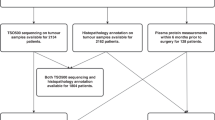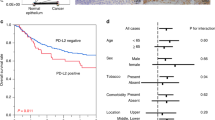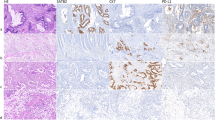Abstract
Survival analysis of 144 histologically confirmed cases of colon carcinoma diagnosed in a 12 year period (1971-82) at the Tampere University Hospital was performed to test the hypothesis that p53 overexpression is associated with a poor clinical outcome. Immunohistochemical staining of paraffin-embedded sections using a polyclonal antibody CM-1 against p53 protein was performed to identify aberrant expression of the p53 tumour-suppressor gene. Sixty-nine per cent of the tumours (100/144) showed overexpression of the p53 protein. The prevalence of p53 overexpression was independent of age and sex of the patient and subsite of the tumour, but was slightly, although not statistically significantly, higher in advanced than in localised tumours. Overexpression was associated with a higher S-phase fraction. Some indication of a larger proportion of aneuploid tumours among those with overexpression was also observed, although this finding did not reach statistical significance. Significantly reduced patient survival for tumours with p53 overexpression was found. Patients with p53-overexpressing tumours had a corrected 5 year survival rate of 37% compared with 58% among patients whose tumours had normal expression of p53. The corresponding 10 year rates were 34% and 54%. In the multivariate analysis using a Cox model, the survival difference was independent of age and sex of the patient, as well as of subsite and stage of the tumour. Furthermore, the effect of p53 overexpression remained after controlling for flow cytometric parameters in an analysis of a subset of tumours. Thus, p53 overexpression appears to be a useful prognostic indicator in colon carcinoma.
This is a preview of subscription content, access via your institution
Access options
Subscribe to this journal
Receive 24 print issues and online access
$259.00 per year
only $10.79 per issue
Buy this article
- Purchase on Springer Link
- Instant access to full article PDF
Prices may be subject to local taxes which are calculated during checkout
Similar content being viewed by others
Author information
Authors and Affiliations
Rights and permissions
About this article
Cite this article
Auvinen, A., Isola, J., Visakorpi, T. et al. Overexpression of p53 and long-term survival in colon carcinoma. Br J Cancer 70, 293–296 (1994). https://doi.org/10.1038/bjc.1994.295
Issue Date:
DOI: https://doi.org/10.1038/bjc.1994.295
This article is cited by
-
Overexpression of TP53 protein is associated with the lack of adjuvant chemotherapy benefit in patients with stage III colorectal cancer
Modern Pathology (2020)
-
Immunohistochemical investigation of prognostic biomarkers in resected colorectal liver metastases: a systematic review and meta-analysis
Cancer Cell International (2018)
-
High incidence of protein-truncating mutations of the p53 gene in liver metastases of colorectal carcinomas
Oncogene (2002)
-
The results of colorectal cancer treatment by p53 status
Diseases of the Colon & Rectum (2001)
-
Expression of high p53 levels in colorectal cancer: a favourable prognostic factor
British Journal of Cancer (1999)



